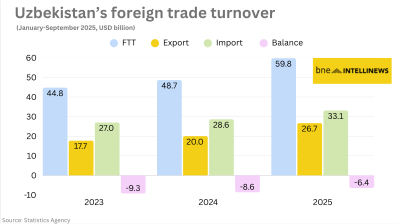This is the first in a series of articles highlighting Uzbekistan’s progress and challenges on the way to technology development.
Engaged in sweeping transformations since the death of dictator Islam Karimov just seven years ago, Uzbekistan is seeing first results in the investment they’ve made to boost their IT sector. Earlier this month Uzbekistan’s IT Park, which supports the bulk of the country’s tech sector, announced that the export revenues of its residents almost tripled in one year, reaching $238 million during the three first quarters of 2023. North America (43%), the EU and the UK (37%) were Uzbekistan’s biggest export partners this past year.
While these numbers are still very modest from an international perspective, Uzbekistan is determined to assert itself in the global IT market, said IT minister Sherzod Shermatov on the sidelines of ICT Week. This yearly event gathered thousands of industry professionals and policy makers inTashkent, the country’s capital, in late October.
“We started from zero just a few years ago and are aiming to achieve $5 billion in IT service and BPO export revenues by 2030,” he said.
Authorities have prioritized the development of these emerging sectors – from the creation of IT Park in 2017, to the nationwide online teaching program “One Million Uzbek Coders,” to this year’s “President Tech Award” with a $1 million prize fund.
Unexpected boost from Russia
The tech workforce in Uzbekistan has received an unexpected boost since February 2022, as cohorts of Russians and Belarusians left their country to escape the war and political repression. Many landed in Central Asia, either temporarily or permanently, including thousands of IT professionals. According to local community estimates, around 10,000 such IT specialists have settled in Uzbekistan for the long term.
This was the case for brothers Artem and Pavel Panferov, along with Artem’s wife Anastisia Markova, who arrived a mere few weeks after the war began. They originally tried to move to Georgia and Azerbaijan, but ultimately ended up in Tashkent because it was easier.
The trio found jobs in tech, and started working on their startup idea at IT Park, which they became residents of. The hub itself now has over 1,400 registered companies, and as of last year, started offering a three year IT work visa to foreign nationals. The hub boasts 0% corporate tax, housing and job assistance to foreigners as well. Currently, over 4,000 foreigners have benefitted from the program.
“There is a lot of opportunity to develop your company and foster ideas,” said Markova.
At the end of the summer, Markova and the Panferov brothers launched their own startup, low-code mobile app developer Encode.io. The company now has over 20 employees, mostly comprised of other relocated Russians and local Uzbek workers. They primarily serve international clients hailing from Europe, Asia and the Americas.
Vladimir, another Russian, landed in Armenia before settling in Uzbekistan in April earlier this year. “I felt I had to escape the draft and strongly disagreed with Putin’s policies,” he said, asking not to be identified.
“We opted for Uzbekistan because my wife’s employer [a Russian company] opened an office in Tashkent. And we don’t regret this choice.”
Vladimir used to manage Big Data projects at a major Russian IT solution provider. The relocated techie now heads the Big Data department of a fast-growing local bank. His salary is significantly lower than before – but local prices are lower, too.
Vladimir said he was also positively surprised by the young Uzbek generation. “They are smart and result-oriented, it’s a pleasure to work and share my experience with them.”
Natalya Mayuta’s arrival in Uzbekistan, in January 2023, had nothing to do with the war or politics. “I felt I burned out at my job in Vladivostok [in Russia’s Far East], and had been thinking of moving somewhere for a long time before,” she said.
“I had never been to Uzbekistan, but my grandfather used to live there and always recalled it warmly.”
Leaving her position as Head of Business Processes at a major Russian e-commerce company, Mayuta was hired by a major Uzbek bank, Hamkor, initially as a business analyst, then as a product owner.
Mayuta said she receives “less conflicts, and a higher salary” in her new job than in Russia.
Staying for good
“There’s at least two or three expats or relocated people in each of our teams,” said HamkorLab’s PR and Marketing Director Ekaterina Sidorova, herself a Russian expat.
Asked to assess their contribution to Hamkor Bank’s digital development, she said that they had "extensive experience working in international financial and IT corporations and unique knowledge.”
Artem, Vladimir, Natalya and their families believe they will stay in Uzbekistan for good. In an unexpected development of this young nation’s history, these Russians are making it closer to the global market, not to Moscow.
Adrien Henni is the founder of International Digital News, a tech news and research agency covering Eastern Europe and Central Asia.
Heerea Kaur Rikhraj is a New York-based journalist. She covers a variety of topics including technology, health, indigenous issues and religion stories.
Tech

Russia blocking messaging apps again, sets up copycat Telegram app
Russia’s internet watchdog Roskomnadzor has been blamed for another round of internet outages in Russia, as the state sets up a Telegram messaging app clone as the Kremlin continues to take increasing control of RuNet.

Albania’s AI minister ‘pregnant’ with 83 children, PM says
AI “minister” Diella will give birth to dozens of digital parliamentary assistants for ruling party MPs.

Is Kazakhstan building a digital utopia, or a China-style surveillance state?
Many Kazakhs will tell you that officials should limit their ambitions to fixing the internet speed. Others worry that the time for joking is over.

Kia inaugurates $310mn "highly automated" automotive plant in Kazakhstan
Featuring 68 industrial robots, the plant is designed to produce up to 70,000 vehicles annually.




